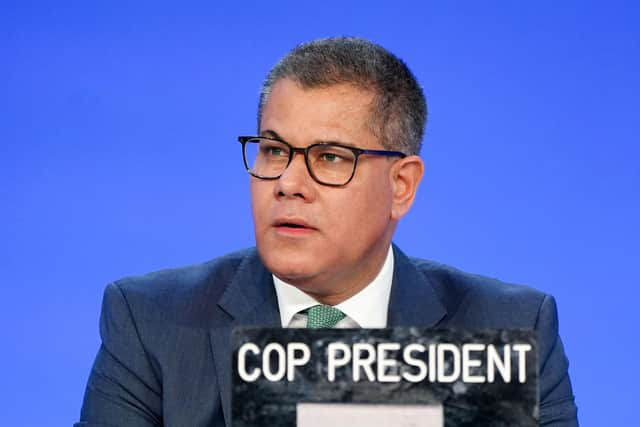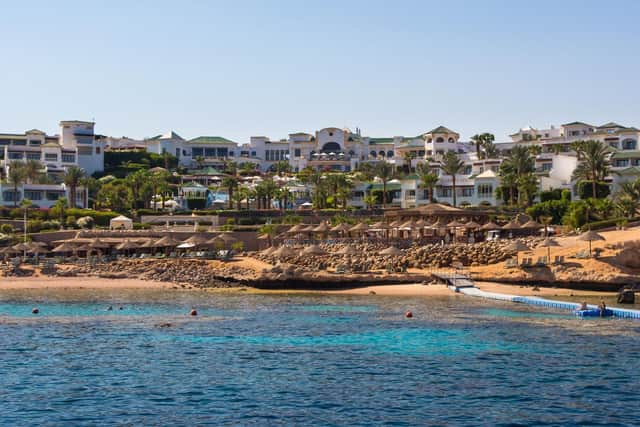COP27: One month to go before ‘delicate’ UN climate negotiations begin in Egypt
The conference, hosted by the UK, was the biggest event of its kind ever staged in Scotland, with around 25,000 leaders and delegates attending the talks and many thousands more descending on the city’s streets to protest.
And what a year it has been since then.
To call it turbulent would be an understatement.
The Covid-19 pandemic has continued to take its toll across the globe, while people everywhere have been enduring an unprecedented cost-of-living crisis.
Advertisement
Hide AdAdvertisement
Hide AdRussia’s invasion of Ukraine has wide-reaching consequences, triggering spiralling inflation and throwing supplies of energy and food into jeopardy.
Meanwhile, record-breaking heatwaves, droughts, storms and floods have been wreaking havoc across the world, causing countless deaths and leaving many countries struggling to deal with major humanitarian crises.
Scientists have linked the extreme conditions with climate change, saying similar catastrophes will become more frequent as global warming continues.


All these issues are likely to affect the landscape at COP27, which is being hosted by Egypt in the resort town of Sharm El Sheikh from November 6 to 18.
The COP26 talks were billed as the most important since the Paris Agreement was set out in 2015.
The aim was to ‘keep 1.5C alive’ – securing global net zero by mid-century and ensuring the goal of limiting warming to 1.5C above pre-industrial levels remained within reach – and to strengthen the Paris ‘rulebook’.


After two weeks of negotiations, which ran over into extra-time, the Glasgow Pact was finally agreed by nearly 200 countries.
In a historic first for a COP decision, the final text made explicit mention of plans to cut coal and end subsidies for fossil fuels.
Advertisement
Hide AdAdvertisement
Hide AdIt also included strong language on the scientific importance of not exceeding 1.5C of heating, calling for larger reductions in greenhouse gas emissions, and pledged more money to help developing countries adapt to the changing climate.
Responses to the outcome were mixed.
Then UK Prime Minister Boris Johnson said COP26 was a success tinged with “disappointment” over watered-down ambitions.
The COP26 Coalition climate justice campaign group described the agreement as “an utter betrayal of the people”, with “hollow words on the climate emergency from the richest countries” and “an utter disregard of science and justice”.
The planet has already warmed by around 1.1C since the 1850s, according to records.
A special report from the Intergovernmental Panel on Climate Change (IPCC), published ahead of last year’s summit, warned of a “code red for humanity”, with global temperature increases likely to hit 1.5C above pre-industrial levels by the early 2030s.
Analysis of the plans set out in Glasgow predict measures fall short, with temperatures due to rise by anything from 1.8C to 2.4C by the end of the century – way beyond the 1.5C target and potentially above the 2C ‘danger’ limit agreed by international scientists.
The issue of climate cash for vulnerable countries was also somewhat kicked down the road, with developed nations admitting they would not reach the $100 billion [£90bn] goal until 2023.
So what will be top of the agenda when the UK hands over the presidency of COP to Egypt in just four weeks?
Advertisement
Hide AdAdvertisement
Hide AdThe COP27 motto calls for nations to work ‘together for implementation’.
Egypt’s president Abdel Fattah El-Sisi has said: “I deeply believe that COP27 is an opportunity to showcase unity against an existential threat that we can only overcome through concerted action and effective implementation.”
Money will be a key theme, with solutions being sought for how the world will pay the bill for tackling climate change – a cost estimated at around $125 trillion [£112 trillion] by 2050.
Concrete commitments are required from the richest nations to help developing countries to adapt and guard against climate impacts and to reimburse them for loss and damage caused by the environmental crisis.
Nationally Determined Contributions (NDCs), targets each country sets for cutting emissions, are also expected to be ramped up.
The Egyptians have expressed hope for the coming talks and urged the developed world to keep its climate pledges to avoid “erosion of trust” in the process.
Speaking about the vision for the conference, COP27 president-designate H E Sameh Shoukry, Egyptian minister of foreign affairs, said: “We must accelerate climate action on all fronts, including mitigation, adaptation and finance, in addition to adopting more ambitious mitigation measures to keep the 1.5C within reach.
“There can be no room for delay in the fulfilment of climate pledges or backtracking on hard-earned gains in the global fight against climate change.
Advertisement
Hide AdAdvertisement
Hide Ad“We must work together for implementation. We need to act, and act now, to save lives and livelihoods.”
The COP27 hosts welcomed actions by Scotland – which does not have a seat at the official negotiating table, but is setting up a Loss and Damage fund – and Denmark as “steps in the right direction” and encouraged other developed nations to follow their lead.
UK minister Alok Sharma, the current COP president, was in the Democratic Republic of Congo for pre-COP27 meetings this week.
He said: “As the impacts of climate change become more extreme, the focus must remain on implementation and action, driving progress on what was collectively agreed in Glasgow.
“And we should be clear – the Glasgow Climate Pact and Paris Agreement must be the baseline of our ambition.”
He said COP26 had “laid the groundwork for more ambitious action”, and “COP27 must be a moment for delivering on these commitments”.
Gina Hanrahan, head of policy at environmental campaign group WWF Scotland, echoed his calls.
“Whilst hosting COP26, Scotland’s commitment to establish a Loss and Damage fund for those most affected by climate change was evidence of bold leadership, but there is a long way to go to ensure funding to protect those most vulnerable to climate extremes and who have done least to cause it,” she said.
Advertisement
Hide AdAdvertisement
Hide Ad“COP26 barely left open the window to keep 1.5C within reach, but now it’s time to deliver.
“When world leaders gather in Egypt, they must bring with them the proof that they have moved on from promises to implementation.”
But getting concrete action over the line at this year’s summit, set against a background of raised political tensions, diplomatic divides and distractions, will require delicate bargaining.
The Egyptians have already warned the UK against “backtracking from the global climate agenda”, prompted by concerns over Prime Minister Liz Truss’s commitment to the 2050 net zero target.
The intervention comes after the new leader, in her first few weeks of office, offered up more than 100 new licences for oil and gas in the North Sea, lifted the ban on fracking and cancelled environmental regulations.
The PM, who claims to support net zero, is expected to take part in the summit, although King Charles III has said he will not attend – on Ms Truss’s orders, according to reports.
Last year the Queen recorded a special message for COP26, while Charles, then Prince of Wales, made a personal appearance in Glasgow.
Comments
Want to join the conversation? Please or to comment on this article.
